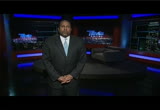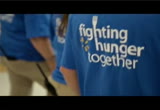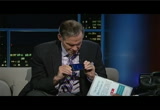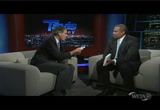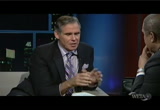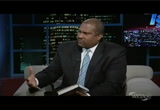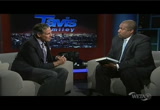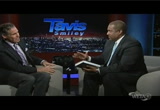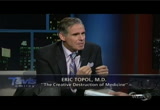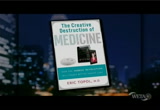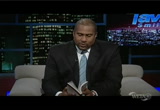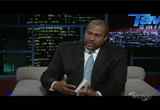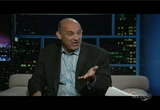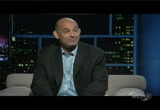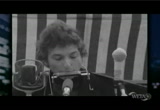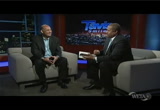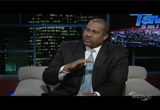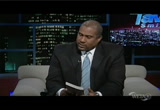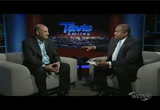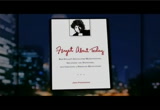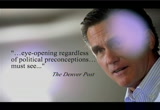tv Tavis Smiley PBS November 3, 2012 12:30am-1:00am EDT
12:30 am
smiley. today we look at health care. dr. topol's new book is called the creative destruction of medicine. also jon friedman is here. this year marks the 50th anniversary of slowing in the wind. his new book is called forget about today. we are glad you joined us for a look health care and the influence of bob dylan coming up now. king had that said there is always the right time to do the right thing. i try to live my life every day by doing the right thing. we know that we are only halfway to completely eliminating hunger and we have work to do. walmart committed $2 billion to fighting hunger in the u.s. as we work together, we can stamp hunger out.
12:31 am
>> the california endowment happens in neighborhoods. learn now. >> and by contributions to your pbs station from viewers like you. thank you. tavis: dr. eric topol has shared the department of the cleveland clinic. he has directed the transitional science institute's and is the ok.hor of the new boat
12:32 am
it is great to have you on the program. >> thank you. >> how will the digital revolution creates a better health care? >> you are used to digitize books and music. how about people? we can get through sequencing once genome. basically everything fed makes you take -- that makes you tick we can change medicine. tavis: give me examples. >> let's say we want to change the cardiogram, and i want to use the smartphone. i have a couple of sensors. i put my finger on the sensor, and i basically have my cardiogram. i can do yours if you would like.
12:33 am
if you want to put your fingers on it, there it is. you have a normal heart rhythm. tavis: please tell me that is good. >> you are doing fine. i can look in your heart. i do not need a stethoscope anymore. i am a cardiologists. tavis: how can you be a cardiologists without a stethoscope. >> here is a device where you see everything with high- resolution ultrasound. it is basically the size of a cell phone, and if i want i could do an ultrasound of your heart. we could do it, but basically,
12:34 am
you never want to use your stethoscope because that is so relatively worthless. you can see everything. the only thing that requires is a little bit of a gel, and you put this on here. my heart, there is. you can see the evolves. you can see the chamber -- you can see valves. you can see the chamber. everything looks perfectly normal. that is a good thing. why would you listen to our heart again? the stethoscope for listening to our heart is over. it is obsolete. that is another way it is changing. digitizing the heart through a portable device, and you can put this on any part of the body and
12:35 am
get a great ultrasound picture. tavis: who ends up paying for this? it is a wonderful thing that you could use a smartphone or a small device like this. these can be used anywhere. i assume all the cost of this gets passed on to the patient. >> that is not a good assumption. once you have this sense are you do not have to charge for durain are cardiogram -- for doing a cardiogram. because $800,000 each. they should be part of the physical exam. you would save an enormous amount. i have got many of these devices did have the potential if we let it happen.
12:36 am
we have not really done that. tavis: what is stopping this? >> we are trying to lead the charge to do this, but most medical centers, this has changed. it is difficult to actualize the new way of practicing this. medicine is ritualistic. when the stethoscope was invented, it took 20 years before doctors would except using a stethoscope, and that is what it is today. it is a story to affect major changes. >> what good reason is there for not embracing the best of what digital technology offers? i understand people get set in their ways, but we are talking about saving lives and cutting costs. i cannot imagine what the push by would be.
12:37 am
the fax i get frustrated because i have seen what happens. -- >> i get frustrated because i have seen what happens. i said, how am i going to get this into reality? basically this is an appeal to consumers, to the public. what we need is this gutenberg moment in medicine. now people can read, because this is on your phone, and there is no reason why most people who can easily get up to speed will drive and no medicine. there are not enough physicians, and the establishment is too rigid to except these profound changes. >> as the patient have any role, any agency he or she can use to drive the future of medicine?
12:38 am
tracks let's say you have high blood pressure, which almost 70 million americans have. you can track that better than ever before. it all you have to do is press start, and you are taking charge of an important diagnostic, and you can say to your physician, i need some guidance, because 11% of the time it is out of range, and this medicine is not working. it is getting more involved because of having one's own data, which was not possible a couple of decades ago. >> there are always advances. there are always challenges that come along with technology so everything about technology is not great. i could offer something
12:39 am
troubling about the development. is the balance sufficient enough to warrant moving forward with these types of advances? >> there are some trade-offs. there is the issue of privacy and security. could you actually increase expense rather than making things more precise and preventive? these are important issues, and what we have to do is validate that they are providing a benefit and that the benefit is overwhelming common-law -- overwhelming, whatever the risks and down sides are. >> talk about what concerns you about the issue of privacy. i know most doctors do not even communicate with their patient via e-mail. >> that basically tells you the whole problem. 68% of american physicians will not e-mailed their patients. that tells you something, but
12:40 am
what we have is the issue of anything digitized is subject to breaches and leaks. this is a problem, because if it is your valuable data, we have already seen that with medical records of some of the top medical centers, so this has to be brought to the lowest level of risk. it is never going to be 0. we have to maximize the impact of having the data that is so portable and useful. it is really a risk benefit story. >> what makes you believe all of ass leads to better how oealth opposed to greater awareness, because they are not the same? >> i am with you, because the big difference is people taking ownership. it is there data information. they did not have access before,
12:41 am
so once that happens that is the biggest shift in history. we are talking about a major shakeup. now you are going to be in the driver's seat. your physician will say, i have got this information. give me some guidance. you are really the one pushing forward, because you have had remarkable panoramic information about yourself. >> dr. topol has brought more gadgets to share with us. go to our website, and you can engage us in conversation about these other gadgets he has brought. i thank you for coming on. it has been a fascinating conversation, and i enjoyed you being fat. up next, join us with off an --
12:42 am
i enjoyed you being here. up next, join us with jon friedman. jon friedman is a widely read media web columnist, also an avid bob dylan fan, which serves as inspiration for the new book, forget about today. bob dylan's reinvention and creating a personal revolution. thank you for being on this program. everybody has their own reason, so your reason for being such a dodi of bob dylan. >> -- nas agenda -- being such a devotee of bob dylan. >> he is still going strong. >> did you think, because he is certainly a genius.
12:43 am
i say to myself, what else could we possibly learn about bob dylan? did you have that thought? >> i did, but i wanted something original. i read the same bad books about bob dylan. i wanted to write something original, and my view is that he is known as more than an entertainer. he is a role model. people can follow his success and learn from it. >> i love the way you have laid out what you have learned and take from his life. let me ask why you think we are so fascinated with bob dylan. you get to a point to be of his ilk where there are books and movies and documentaries and people cannot seem to get enough of you. what is our fascination with bob dylan? >> we all have our own bob
12:44 am
dylan, whether it is a born- again, rock-and-roll, country. he has done so much for so long that everybody that is a fan of his has their own issue of bob dylan. >> i love the way you laid the book out. tell me how and why you decided to go about it this way. >> i made an album with 10 songs, and it is how you can learn lessons from his example. the point is no matter what happens in your life, success or failure, keep pushing forward. do not be overwhelmed by your past, just keep pushing forward. people get in habits and russ in my for they are successful or not successful and they have their own comfort zone and are afraid to step out of it. >> i love chapter 4, ain't nobody liked dylan. crags that chapter tells you,
12:45 am
you have a lot of words. you have a lot of value. you have value for the world. >> i do not want to give all of these away, but chapter 9 is living beyond other people's expectations. >> we have parents, teachers, and who think we only have one thing pigeonholed in life, yet if you try to, you could break out of those roles with something gering. the key is to be adventurous. >> is this really inspired by his wife, his lyrical content, or both -- his life, his lyrical content, or both? >> i learned how adventuress he was. we learned he has done so many different kinds of things. he never stays in the same
12:46 am
place for too long. he has always tried to push forward and tried things that are brand new. it is really commendable in life. >> how has he navigated, and what do we learn from how he has navigated the critics 7? there are a lot of fans, but he has his critics. he has his critics, so what do we take about how to navigate a life around the minefield of critics? >> ignore them. try not to take it personally. people who criticize you. do not take it personally. trust yourself, and do what you think is right, and eventually the world catches of to you. dillon always thinks he is ahead of the game. he does not worry about failure. when he tried something new, failure is not part of the equation. if it happens and people thinks
12:47 am
he fails, that is their problem. he never worries about it. tavis: in no particular order, the story of what would have been his appearance on the ed sullivan show. >> he was almost 22, and ed sullivan is the biggest name in show business -- they tavis smiley of his day. tavis: not exactly. >> he invites him on the show as a rising folksinger, and dillon wanted to sing the john birch society, -- dylan wanted to sing the john birch society, and they said it was too dangerous, and he said, no, and he walked off the show. you think about that. walks off, itdianguy is amazing, but he has so much
12:48 am
self-confidence it was worth it to say no thanks. >> he boasted the newport folk festival. i will let you tell the story. >> he goes over there with the paul butterfield band, and he plugs in an electric guitar and glass music, and everybody was so shocked. he was a folk icon. you cannot imagine what it was like because he was such a revered figure. it was loud, and people were just shocked and horrified, and they wanted cut him off common on -- cut him off, and he got booed by his so-called friends, yet he kept going with rock-and- roll, etc., country, everything else. >> what have you learned writing this book racks because of their
12:49 am
12:50 am
no matter what is said about prince in the media, he does not respond. no matter what is said about bob dylan in the media, and they have said vicious things about prince over the years. they have said vicious things about bob dylan over the years, and neither of these guys have taken the time. they do not tweet about it. they do not blog about it. good, bad, or indifferent, there is a confidence this guy has and what he does to not allow him to even respond to the critics. he does not respond. as the guy who is sensitive, i know the difficulty that comes with trying not to respond. every now and then, i feel the need to respond to certain
12:51 am
things. by and large, i do not, but i marvel at that where anything and everything can be said about these guys, and they are so confident. >> they are so sure whatever they are doing is the right pasth. i saw prince in concert. he is incredible. the man is absolutely incredible, and you can see he believes in what he is doing. i saw a dylan at the hollywood bowl. he is so sure of what he is doing. if you do not understand, that is your problem, not theirs. >> i am not the kind of charges they are, but for everyone of us, there is a point where you are not as good, our figures --
12:52 am
our fingers do not slide the way they should. he is human. how does he navigates that journey? >> reinvention. a im 71 im 71 years old. i have changed. my voice has changed. he is being authentic to what he has always done. you see bob dylan's singing or playing. he is going to use all of his strength to put across his message and what he wants to put across to the audience. >> this is a tribute in many ways from you to dylan. how has he impacted your life? >> i have always been impressed
12:53 am
by how he has moved from folk to rock-and-roll to country to gospel, yet he always has the same stamp on his music and lyrics and personae, and i have learned you try to take up with you. you do not listen to what critics say. you have got to push forward. the lessons i have learned personally from his life. >> there is so much talk about the route madonna has taken and the way she has chosen to advance her career at this particular point. if not to advance, the word is to extend her career, and that is the argument, that she extended but is not advancing it. what about bob dylan, and that
12:54 am
you accept the fact you are aging, and the public is like, a enough already. >> the talent for madonna, and older rock and roll star, is to reinvent yourself effectively. you still have a connection with your audience and france, and you do not look like a fake or someone who is trying to capitalize on past glory, hand madonna went to -- and madonna went to bob dylan 101. she will figure it out. >> apparently that is what he does awfully well. the book is called forget about today. she needs for reinvention, creating a personal -- thank you for
12:55 am
coming on. that is our show for tonight. you can download our app. good night from l.a. thanks for watching. as always, keep the faith. today's show, visit tavis smiley at pbs.org. tavis: hi, i'm tavis smiley. join me next time for a conversation with oliver stone. peter kuznick. that is next time. we will see you then. >> there is a saying that dr. king had that said there is always the right time to do the right thing. i try to live my life every day to completely eliminating hunger and we have work to do. walmart committed $2 billion to fighting hunger in the u.s. as we work together, we can stamp hunger out.
12:56 am
115 Views
IN COLLECTIONS
WETA (PBS) Television Archive
Television Archive  Television Archive News Search Service
Television Archive News Search Service 
Uploaded by TV Archive on

 Live Music Archive
Live Music Archive Librivox Free Audio
Librivox Free Audio Metropolitan Museum
Metropolitan Museum Cleveland Museum of Art
Cleveland Museum of Art Internet Arcade
Internet Arcade Console Living Room
Console Living Room Books to Borrow
Books to Borrow Open Library
Open Library TV News
TV News Understanding 9/11
Understanding 9/11